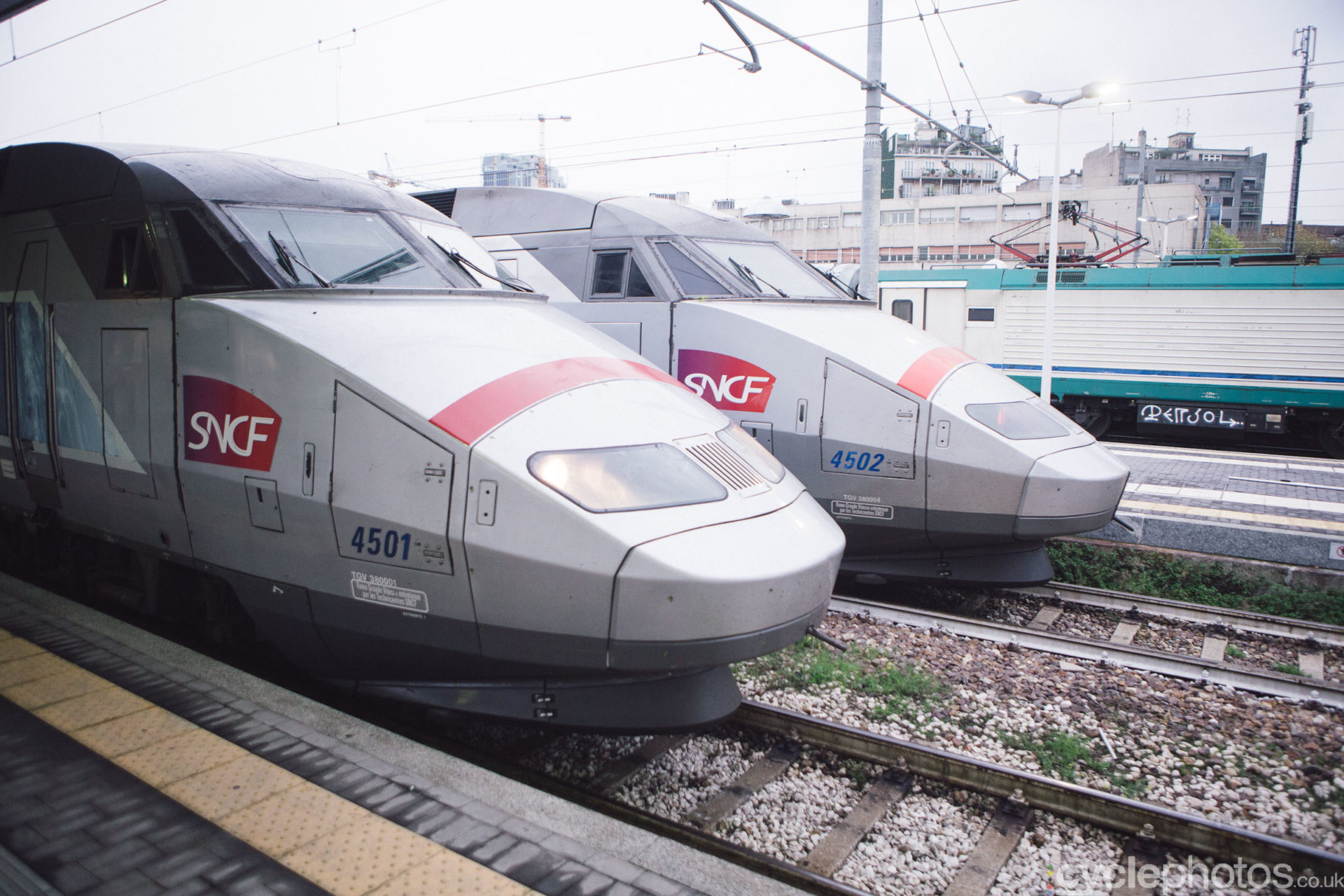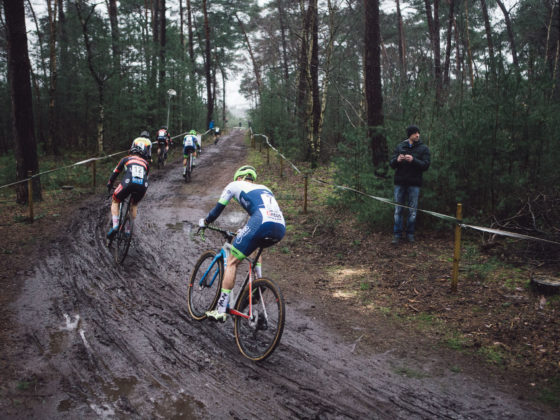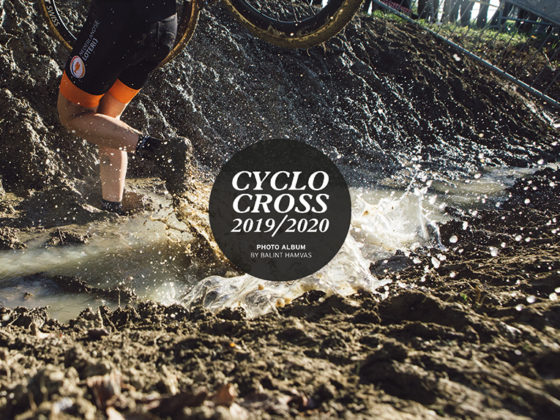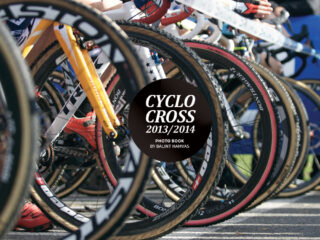It all started last summer. Our son was born in January and the more I thought about it, the more guilty I was feeling about the the future he is going to inherit from us. I didn’t have to go far for examples of excess, I am/was a bad offender myself. While I try to do as much as possible to leave smaller footprint – I don’t eat much meat, I don’t buy fast fashion, walk as much as I can, don’t buy plastic bottles, etc. – all that good is probably undone by all the flying I used to do. And I used fly a lot. So the first step should be to fly less. After the two World Cups in the US, I decided that I would take trains to all the races outside of Belgium and Holland. This meant five trips: Bern, Silvelle, Tabor, Nommay and Dubendorf. Easy, right? Not quite, but let me dig into each trip, because each trip had its own learning.
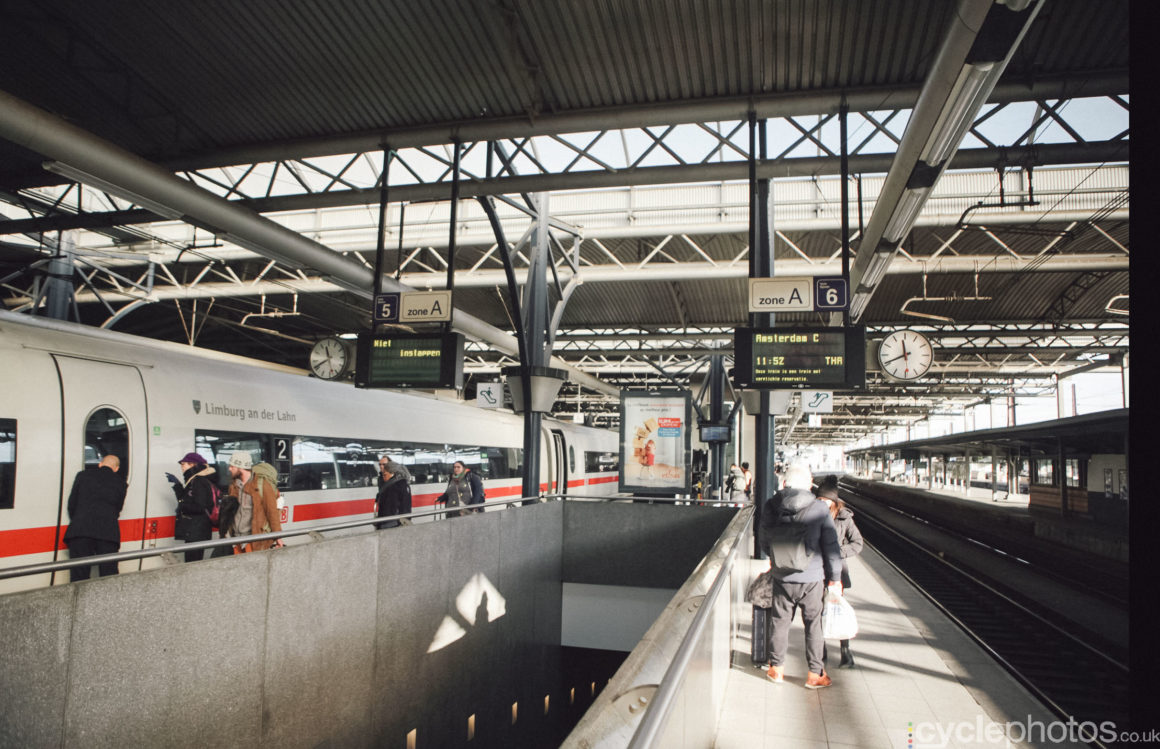
Brussels to Bern
The first trip. The difficulty of the Bern trip was that the Superprestige race in Boom was held just the day before, so I had to find an overnight train, that arrived in Bern early enough for the juniors race in the morning. I started searching for tickets on oui.sncf, but I’ve only found very expensive options. That’s when I discovered loco2.com, which offered very reasonable prices for trips out of Brussels. As all trips led through Germany, I wondered if good old Bahn.de might be even cheaper, have better options. And it did. After a lot of toing and froing, I settled for the following:
Brussels – Cologne 7:25pm – 10:07pm
Cologne – Basel: 11:37pm – 06:22am
Basel – Bern: 06:30am – 07:30am
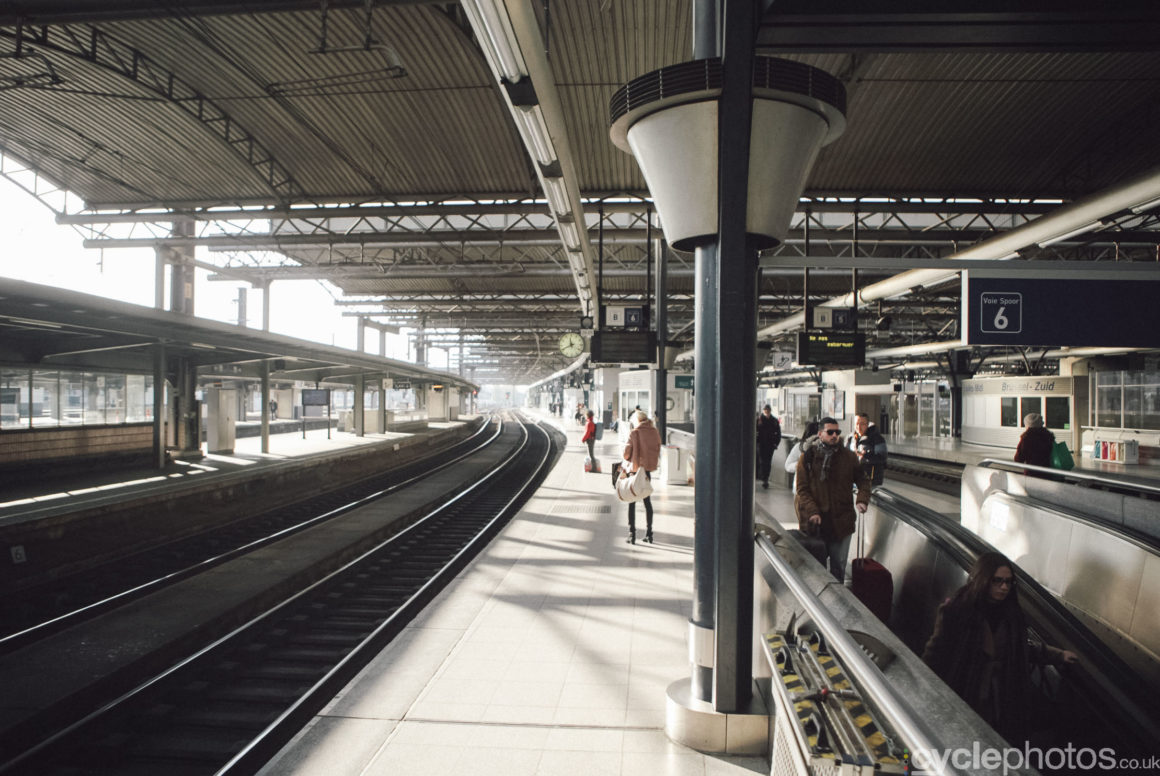
It looked perfect on paper, as the Thalys from Brussels left late enough for me to catch it after Boom and it arrived early in Basel. Though there wasn’t a night sleeper option for the overnight leg between Cologne and Basel, I made the overly optimistic assumption, that it wasn’t going to be a problem. It was. Turns out, I can’t really sleep upright on hard train seats. So Rule #1 was devised: don’t travel overnight in a normal train carriage, unless there is no other way to get there. If I didn’t have to work, it probably would have been ok. But I didn’t have time to for a quick nap upon my arrival, I had to go straight to the course. Adrenaline took me through the first two races, but I was so tired after the women’s race that I could barely move. Somehow, I survived the day, but I felt seriously impeded in my work by the lack of sleep.
The trip back on Monday was a pleasure, four easy hours to Cologne and another three to Brussels from there.
The total cost of train-related part of the trip came to £120.
London to Milan (via Paris)
The second trip was to European Championships. The tricky bit there was the length of the Paris-Milan leg, which takes seven hours and trains only go twice a day. The only option, it seemed, was to get the Eurostar from London to Paris in the morning, then take the 12:45pm TGV to Milan, rent a car there and drive the rest of the way to Silvelle. This looked good on paper, but there was one problem: the train arrived with a 30 minute delay in Milan and I missed the 8pm closing time of the AVIS car rental office. This was slightly puzzling, as the website stated that it was open until 10pm. Alas, in reality, it wasn’t. This lead to Rule #2: double check at the time of booking the opening times of services and shops at train stations, as they aren’t available 24/7 as they often are at airports. At big airports, flights come and go at all hours, so most rental places are open either all day, or they have your flight details and if you are delayed, they wait until you land. This clearly wasn’t the case at Milano Centrale.
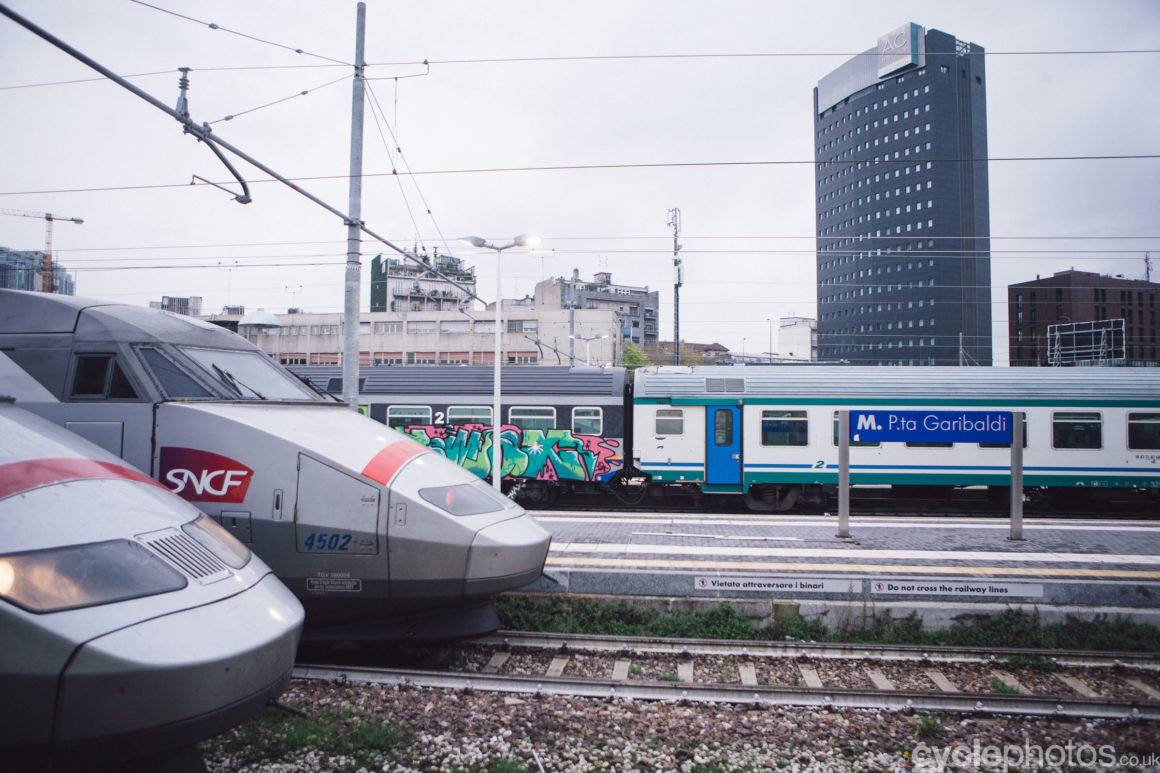
I called AVIS and after a lengthy conversation, the chap found a car for me at Malpensa. It’s just an hour away by train, so I thought that’s ok. Only I missed the 21:35 train by two minutes, so I had to wait for another hour for the 10:35pm train. Long story short, I was sitting in my rental Punto by midnight – I only had three hours left to drive, hurrah. But fate still wasn’t done. By the end of this long day, my phone battery died. No problem, I thought, I have a charging cable, I’ll just charge it in the car. Except this Punto, probably the last such one in Europe, didn’t have a USB slot. I’ve been renting cars for almost two decades now, but I don’t think I’ve seen a rental car without it in the last ten years. So there I was, at midnight, no idea where I was going, as I use my phone for navigation. At least I remembered the general direction, so I was driving towards Venice, and after almost an hour, I’ve finally found a petrol station, that was open and had a cigarette-lighter-to-USB thingy.
As on the previous trip, the return leg was smooth, without any hitches.
The total cost of train-related part of the trip came to £204
Brussels to Nürnberg
The third trip took me to Tabor and the familiar problem presented itself again: the next day, there was a race in Belgium, so I somehow had to make my way back to Brussels by Sunday lunchtime. I looked at many different options, but there was only one, that seemed to work: take the train from Brussels to Nuremberg on Friday, hire a car, drive 3.5 hours to Tabor. Cover the race on Saturday, then drive back 3.5 hours to Nuremberg on Saturday night, spend the night somewhere near the train station and catch the first train at 5:35am on Sunday to arrive in Brussels by 11:30am. It all looked good on paper, but there were several hitches.
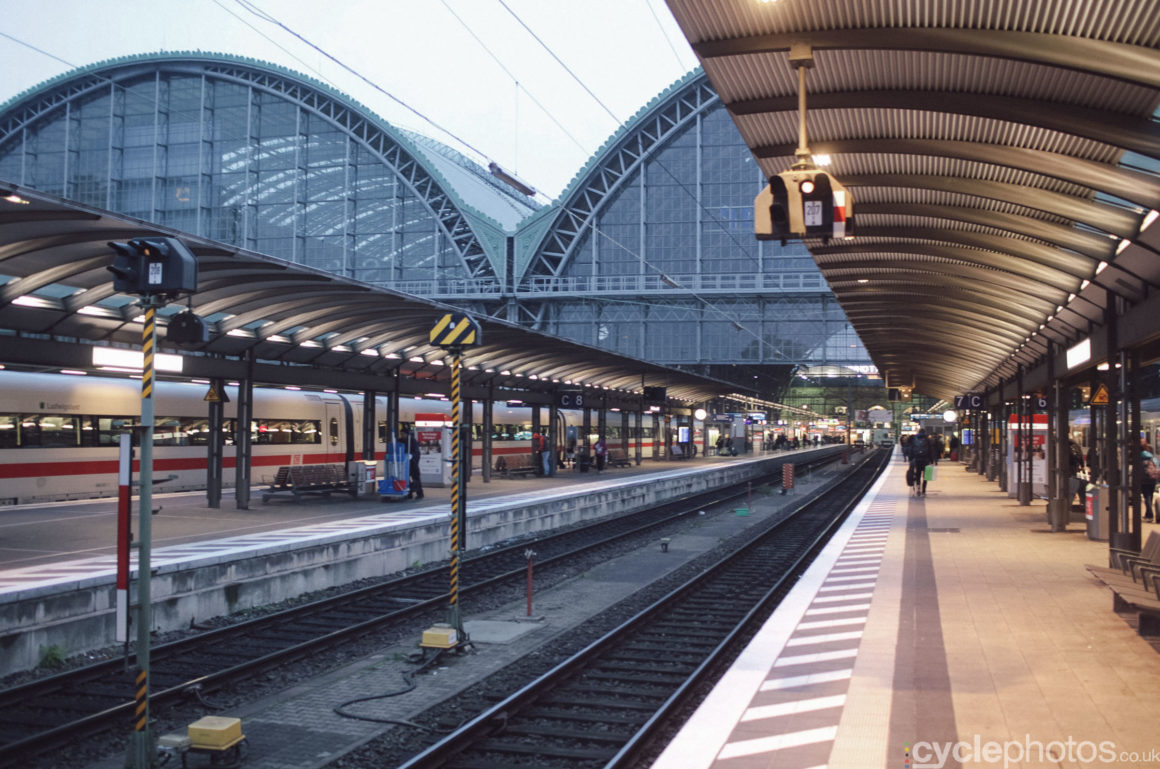
Firstly, the day before, on Thursday, I got booked for a job, which meant that I was spending most of the night in the car, driving from the Wembley to Brussels Midi. I arrived at 3am and I thought I might as well catch some sleep in the car in the underground parking lot just outside of the station. I assumed that it would be safer to do so than at a random service station somewhere on the motorway. I’m sure it was safer, but what I didn’t factor in was the fairly loud music that was playing in the car park. Maybe I’m a light sleeper, but I didn’t sleep much. Then came the next challenge. At around 5am, I checked my phone and I saw a red note on my ticket. Turned out, my 6am train was cancelled. When that happens, you go to the train company’s information desk and they give you a certificate, that indeed, the train has been cancelled and your ticket is valid on the next train. For the first leg, this wasn’t a problem, as the 8am train to Frankfurt wasn’t too busy, so I could find a seat without much hassle. It wasn’t the case for my second train of the day – the Frankfurt-Nuremberg train was packed, so I spent much of the two hours sitting on the floor of the train.
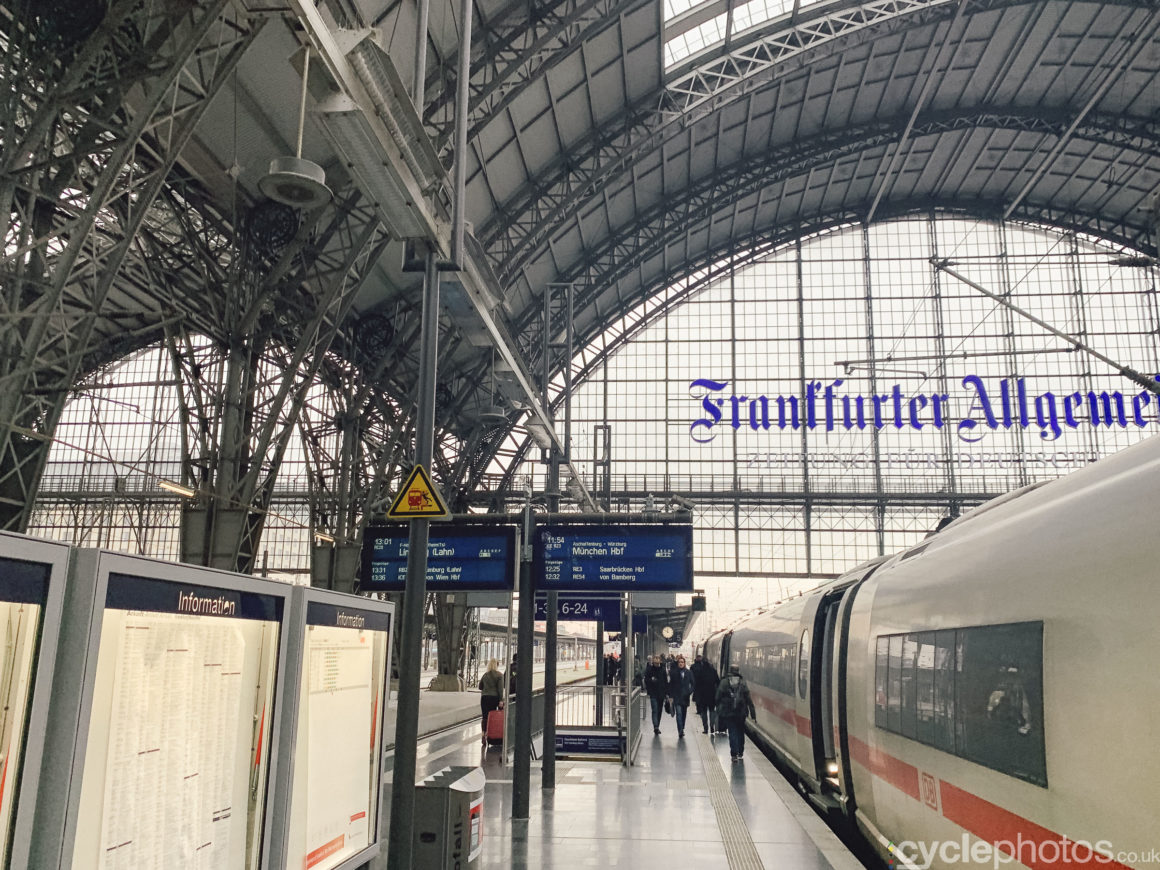
Missing a train can be tricky, because even if I discount the discomfort of sitting on the floor, if the cancellation occurred later and a carefully put together travel plan unravels due to a cancelled train, the train company is not obliged to look after you, like an airline would be. With this one, I was lucky, because my plans weren’t fundamentally affected by this, other than I got to Tabor two hours later than planned. But if I missed a once-a-day train, like a night train, things would have been different. Then there is car rental. Of the major car companies, only Sixt was offering out-of-hours car return, which was essential, as I needed to drop off the rental car at 5am. Again, I was lucky, because Sixt was actually quite cheap, but what if they weren’t, or what if nobody offered it?
The total cost of train-related part of the trip came to £125 (incl. car hire)
London to Belford/Montbeliard (via Paris)
The penultimate trip was to Nommay and this had looked fraught with problems weeks prior to the trip. The transport workers’ strike kept me on my toes in the days leading up to the trip, wondering if all of my trains would run on the day. SNCF was kind enough to send me a message two days before departure, that no, my trains wouldn’t be affected. Great news. That being said, my trip quickly unravelled when I arrived in Paris. While in many capital cities in Europe there is a central station, where most of the important trains run into/through, Paris has a number of big train stations, so switching from the Eurostar to my next train is a lot, lot more hassle than it is in Brussels, where one just walks a few meters to the next platform. No, in Paris, you have to jump on public transport or get a taxi and travel a good 15 minutes to get to the station you need to continue your journey.
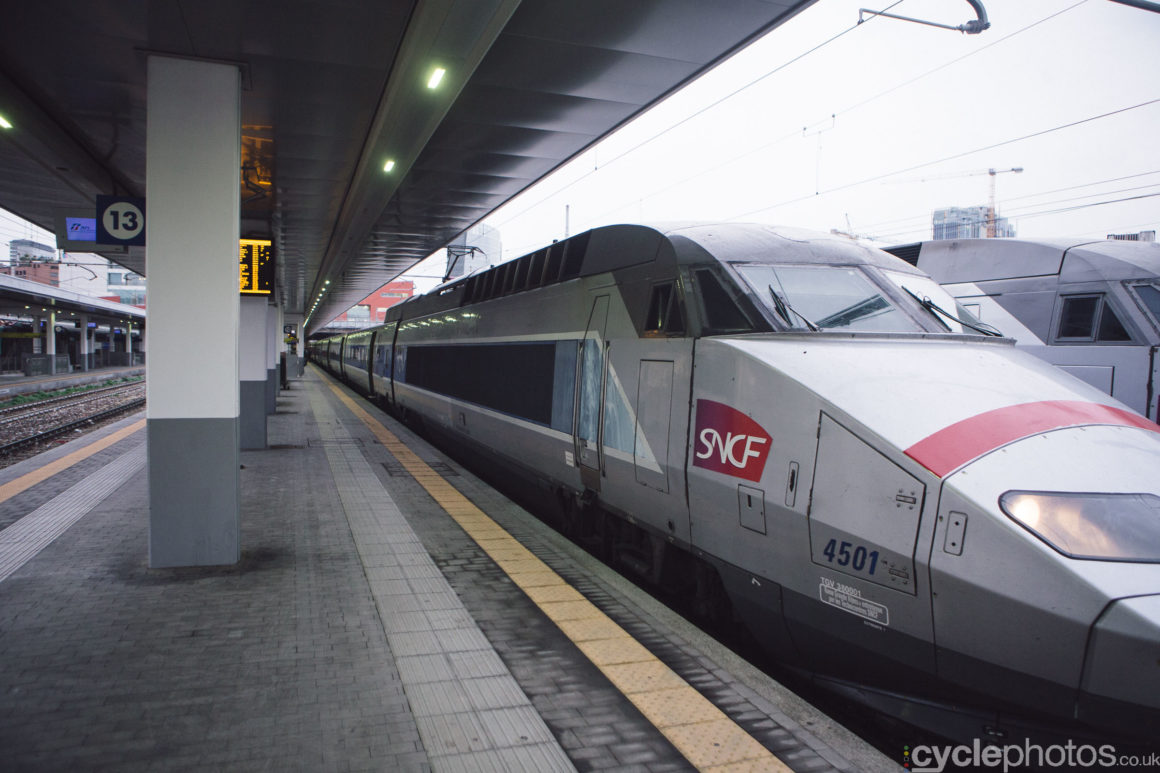
This proved problematic that weekend. The RER line that runs every five minutes normally was massively delayed and then cancelled, so I thought maybe I could get a taxi there? I went back up and try to hail a cab – but there weren’t any. The police wanted to contain a big demonstration just outside of the Gare du Nord, so the area was in lockdown. Finally, I found a taxi, whose driver said it would either cost me €80 to get to Gare de Lyon or we could wait until he finds someone to share the ride with and then it would only cost €40. That would have been still daylight robbery, but at that point, I didn’t really have a choice. So we were waiting and waiting, the clock was ticking and I reached the point where it became seriously doubtful that I’d catch my train, unless we left immediately. I offered him €70, he reluctantly agreed and we left. We didn’t get too far. Most of central Paris was either in lockdown or major avenues were made one-way, thus preventing us from driving towards our destination. We were about halfway there, when ha admitted that he couldn’t go any further: we were surrounded by police barricades and one-way traffic. We agreed on €20 and I was trying to get to Gare de Lyon on foot. I missed the train by three minutes… Luckily, there was another one an hour later, only the last train that would have gotten me from the TGV station to Montbeliard proper had already left, so I spent 45 minutes on a local bus.
This connection, by the way, the Montbeliard/Belfort TGV to Montbeliard Ville one is also a joke. The distance is 12 kilometres as the crow flies, yet there are no direct trains – one has to change at Belfort, after a short, nine minute ride. I am sure there is a legacy reason for this, but it still doesn’t make sense.
The only reason I whinged about the above episode is to show another example of friction in train travel.
The total cost of train-related part of the trip came to £267 (including the cost of the second TGV ticket)
London to Zürich (via Paris)
This was my final trip, the big one for the Worlds in Dübendorf in Switzerland. This was the only journey without hiccups, though due to the strike in Paris, it was a close call and I only had two minutes to spare when I settled in my seat on the train from Paris to Zürich. Also, this was probably the trip that was the most likely to be on par with flying in terms of travel time.
Also, I have to admit, I flew back home, because Finn wasn’t well and I felt I needed to be with my family as soon as possible.
The total cost of train-related part of the trip came to £155
After all this hassle, you might ask, why did I bother to do it the hard way and make my life harder? Well, here is why:
- Train travel is fun. I like trains, they are fast, quiet and comfortable compared to planes. You can get up whenever you want and you have a much better sense of the distance, when cover it on the ground. These might be personal preferences, but there is definitely less time wasted in lines, waiting for security, boarding, etc. whilst flying. Taking the train leaves me with more time to read, work or relax.
- Even with the occasional longer driving sections, my CO2 emissions were around the 10th of what flying to these races would have resulted in. I know I’m just one person and this hasn’t even started to make a dent in this pollution madness, but I do believe that one should take responsibility, even though to stop global warming we need to do something on a societal level.
- Chances are, it’s not going to be cheaper that air travel, but if you are savvy, you could keep the costs in check and get away with prices that are comparable to the cost of a flight, especially if you have to have check-in luggage (like I always do) or pay extra for extra legroom (like I almost always do).
A few useful links:
oui.sncf
bahn.de
loco2.com
seat61.com
Have you done much traveling by train? Let me know in the comments and also let me know if you have tips or advice for future trips!
